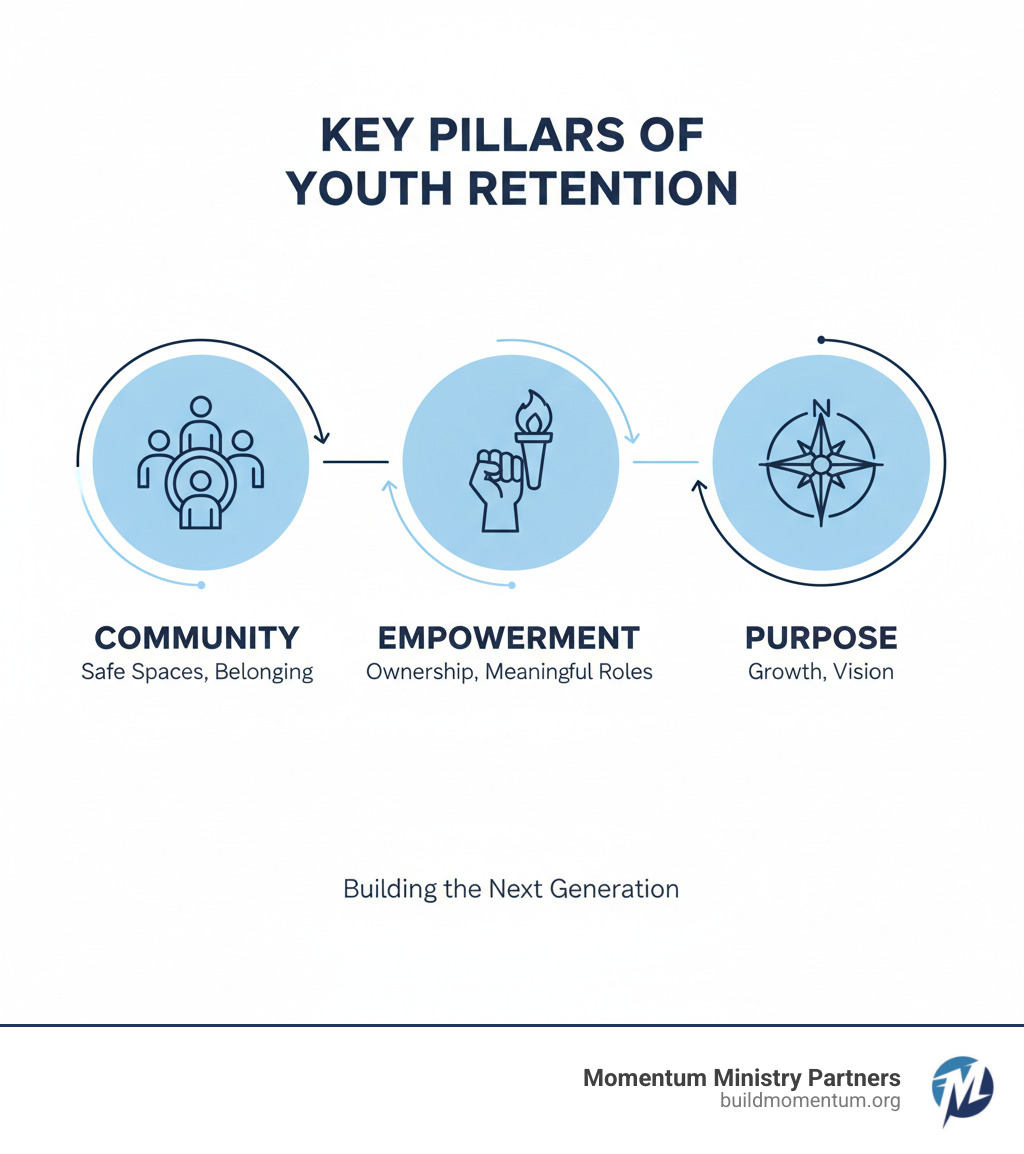Why the Youth Exodus is Threatening the Future Church
Effective youth retention strategies are vital for building the next generation of Christian leaders. The statistics are sobering: young people are leaving organizations at high rates. For example, Gen Z employees are 32% more likely to leave than Millennials. In youth groups and organizations like Scouts BSA, we see similar patterns, with 50 percent of all Scouts leaving between ages 13 and 15.
Quick Answer: The 5 Core Youth Retention Strategies That Work:
- Build Deep Community – Create safe spaces where authentic relationships flourish
- Empower Youth Leadership – Give students real ownership and meaningful roles
- Provide Growth Opportunities – Offer Bible study, service projects, and spiritual development
- Modernize Your Approach – Use technology and social media to reach Gen Z effectively
- Partner and Listen – Collaborate with parents and continuously gather youth feedback
The church faces a critical moment. Young people are leaving, not because they lack a desire for purpose, but because they seek authenticity, empowerment, and growth. With 76% of Gen Z wanting more time to learn new skills, our ministries must provide environments where they can develop spiritually and personally.
Having served in ministry for over three decades and now leading Momentum Ministry Partners, I’ve seen how the right strategies transform youth groups into thriving communities. Retention isn’t about entertainment; it’s about discipleship, empowerment, and creating Biblical community where young people choose to stay and lead.

Understanding Why Youth Disconnect
The youth ministry landscape has transformed. To develop effective youth retention strategies, we must first understand why young people disconnect.
Generational shifts are reshaping everything. Gen Z, the most diverse generation yet, brings unique perspectives. According to the Great Place to Work report on Gen Z, 47% of Gen Z identifies as people of color, making inclusion a non-negotiable value. They prioritize authenticity and purpose over traditional stability.
When youth programs feel inauthentic or fail to accept diversity, young people walk away. They aren’t being difficult—they’re being discerning.
A lack of genuine belonging is a major issue. Surface-level relationships don’t satisfy a generation craving real connection. If ministries only offer superficial interactions, students will seek deeper community elsewhere.
Program boredom is another ministry killer. The significant drop-off between ages 13 and 15 happens when young people seek new challenges. Repetitive programs that don’t adapt to their evolving needs risk losing them to other priorities.
Spiritual doubt is often ignored. Today’s students are exposed to countless worldviews. If we don’t create safe spaces for them to ask tough questions, they may conclude Christianity is irrelevant. As we’ve explored in How Churches Can Keep Youth Engaged, addressing these core issues is essential.
Common Barriers to Youth Participation
Beyond generational shifts, practical barriers often prevent engagement. These are often logistical or emotional obstacles that ministry leaders can address.
Transportation issues can be a significant hurdle, especially for those from lower-income or single-parent homes.
Busy schedules overwhelm today’s students. Rigid programs often lose students who want to participate but can’t manage another commitment.
Lack of parental support is a major factor. When parents aren’t invested, students struggle to prioritize youth group. This requires engaging the entire family.
Social anxiety and fear of judgment can be paralyzing. The fear of not fitting in or being judged can keep students away. Our Students Facing Worry and Anxiety Student Panel Video shows how prevalent these concerns are.
Perceived irrelevance of faith is a problem when students don’t see how Biblical truth connects to their daily lives. If faith feels like just another task, it will be deprioritized.
What Younger Generations Want
To develop effective youth retention strategies, we must listen to what Gen Z and Millennials need. These insights apply directly to our faith communities.
Purposeful engagement is a top priority. Young people want to know their involvement matters. This means connecting faith to real-world impact and meaningful service.
Authenticity is crucial. Gen Z values transparency and leaders who are genuine about their faith journey, including their struggles.
Flexibility reflects their reality. The Deloitte report on Gen Z and Millennial preferences shows that nearly 75% say flexibility is their top priority. We can offer diverse program formats and be understanding of their schedules.
Mental health support is essential. With 67% of young people expecting communities to support mental health, our ministries must be safe spaces where these struggles are acknowledged and supported.
Inclusivity is expected. As the most diverse generation, they expect environments that welcome and celebrate differences, demonstrating Christ’s radical love for all.
Opportunities for continuous growth are key. 76% of Gen Z wants more time to develop new skills, including spiritual and personal development. As discussed in How is Generation Z Changing Youth Ministry?, our programs must offer rich Biblical learning and practical life skills.
The Foundation: Building a Thriving Community of Belonging

A thriving community of belonging is the cornerstone of effective youth retention strategies. You can feel it instantly—there’s genuine laughter, deep conversation, and a natural sense of welcome.
Biblical fellowship is more than pizza and games. True community, like that of the early church in Acts, is built on genuine love, acceptance, and shared purpose. This is what makes people stay. Relational ministry focuses on building these relationships, not just running programs. Young people stay for authentic connections with leaders who genuinely care.
Creating safe environments is about more than physical safety. Emotional safety allows students to admit doubts without fear of judgment. When we foster trust through consistency and care, we create a space where faith can flourish.
The magic happens in shared experiences—mission trips, deep small group discussions, or spontaneous worship. As noted in Three Ways to Make Youth Group a Thriving Community, these moments are cultivated through intentional community building.
Creating a Safe and Inclusive Environment
Helping young people feel welcome and secure is critical. Every detail matters.
Emotional and psychological safety begins with leaders who listen more than they fix, showing genuine interest and resisting easy answers to complex problems.
Welcoming new students requires a strategy. The awkwardness of being new is overwhelming. Use designated greeters, buddy programs, and inclusive activities. Our experience helping churches with Creating the Right Environment for New Freshmen shows these strategies dramatically improve retention.
Clear anti-bullying policies are necessary, but a culture that celebrates differences is better. When we help students see how Embracing Diversity Reflects Christ’s Love in Our Communities, we are being Biblical. Christ’s body includes everyone.
Grace-filled conversations occur when leaders model vulnerability. Sharing our own struggles gives students permission to be real, creating an environment where faith questions are welcomed.
Fostering Deep, Authentic Relationships
Surface-level relationships don’t last. Deep, authentic relationships require effort but are what keep young people engaged long-term.
Mentorship provides the personal investment students crave. A leader’s genuine interest communicates value in a way group activities cannot. We’ve seen great success when High School Students Mentor Middle School Students, benefiting both groups.
Small groups create space for meaningful conversation. In smaller settings, students can share, ask questions, and build friendships. The principles in 5 Simple Ways to Build Trust in Your Small Groups are proven to foster the necessary vulnerability and trust.
Discipleship partnerships pair students for mutual accountability and prayer. These relationships often become the foundation for lifelong Christian friendships.
Leader vulnerability is essential. When leaders share appropriate struggles, they model what real, growing faith looks like. This gives students permission to be authentic.
Intentional connection occurs in both structured and informal moments. The most significant conversations can happen during setup or car rides. Creating space for these natural interactions is invaluable, and even simple activities from Play with Purpose: Meaningful Youth Group Games for Building Community can facilitate connection.
The foundation of lasting youth retention strategies is relational. When young people find genuine community and a safe space to grow, they don’t just attend—they invest, lead, and stay.
Proven Youth Retention Strategies for Lasting Impact

Community is the beginning, but the most effective youth retention strategies actively engage young people as leaders. When we shift from treating youth as an audience to empowering them as participants, their commitment deepens.
This requires intentional youth empowerment. Instead of busy work, we must offer meaningful roles and real responsibility. A student who helps plan worship experiences it differently. As we explore in 3 Essentials to Effective Student Discipleship, empowerment is a pathway to deeper spiritual growth. High retention is the natural result of young people feeling valued and purposeful.
Empower Youth with Ownership and Leadership
The most transformative youth retention strategy is moving young people from the audience to the stage. This means trusting them with real influence over their ministry.
Involving youth in planning is crucial. Plan with students, not for them. Ask for their input on topics and events. When they help create something, they are invested in its success.
Giving students real responsibility demonstrates trust. This means more than setting up chairs; it’s managing social media or coordinating a service project. Ownership motivates them to step up.
Student-led worship and service opportunities connect faith to action. Whether leading music, praying, or organizing projects, these roles help them use their gifts. Our article From Consumers to Contributors: Empowering Youth in Worship shows how this shift empowers students.
Creating comprehensive student leader training programs equips young leaders for success. This isn’t just a title; it’s training in communication, discipleship, and leadership. Our Step-by-Step: Creating a Student Leader Training Program provides a helpful roadmap.
Valuing their input means listening to and acting on their feedback. When students see their suggestions implemented, they know their voice matters, which creates deep loyalty.
Offer Opportunities for Growth and Purpose

Young people crave depth and purpose. Providing clear pathways for spiritual growth is an essential part of any youth retention strategy.
Spiritual development through deep Bible study is the foundation. Move beyond surface-level talk to offer engaging studies that tackle tough questions. Our Essential Student Bible Study Books: Our Top Picks offers resources that challenge and inspire.
Creating safe spaces for tough questions and doubt is vital. Today’s youth need permission to wrestle with difficult questions. When we address doubt with grace, we help them build stronger faith. Our resource How to Help Your Students Overcome Doubt offers guidance for these conversations.
Christian mission trips and service projects turn faith into action. These experiences allow youth to see Christ’s love in action and understand their role in God’s story. Explore our Christian Mission Trips for inspiration.
Connecting faith to real life is key. Youth need to see how Biblical principles inform their relationships, choices, and purpose. This helps them pursue God’s Purpose: Encouraging Youth to Pursue Godly Success in all they do.
Implement Meaningful Recognition and Incentives
While intrinsic motivation is the goal, thoughtful recognition plays an important role in youth retention strategies. This is about celebrating growth and affirming value, not bribery.
Celebrating milestones and acknowledging contributions creates a culture of appreciation. Recognize spiritual growth, leadership, and consistent service through public thanks or certificates.
Verbal affirmation and student spotlights are powerful and cost nothing. Sincere encouragement and highlighting a student’s journey shows that every person matters.
Leadership retreats and special opportunities for student leaders provide advanced training and communicate that their role is valued. When responsibility comes with investment, they are motivated to step up.
The most effective incentives are relational and developmental, such as special responsibilities, leadership titles, extra time with mentors, and input into important decisions. These demonstrate that their leadership is taken seriously.
Modernizing Your Approach: Outreach and Continuous Improvement
The world is evolving, and our youth retention strategies must keep pace. The key isn’t abandoning timeless Biblical principles, but finding fresh, relevant ways to share them.
Technology is the primary language of Gen Z, making digital communication essential. But modernizing is more than social media; it’s about creating parent partnerships, community connections, and feedback loops to keep your ministry responsive. Targeted outreach is needed for youth facing life challenges. Research on recruitment strategies for disconnected youth shows traditional methods can miss the mark. The most successful youth ministries constantly learn and adapt. They listen to students and partner with parents, and as shown in How to Engage Parents in Your Student Ministry, involving families in this process multiplies your impact.
Adapting your youth retention strategies for the Digital Age
Meeting Gen Z means embracing their digital world. This generation grew up with smartphones and expects seamless communication.
Social media outreach is the new front door. With 73% of job seekers ages 18 to 34 finding jobs through social media, they are certainly finding communities there too. Use your platforms to tell authentic stories of growth and friendship, not just to announce events.
The fast application process principle applies to ministry. With 60% of Gen Z job seekers wanting job applications to take under 15 minutes, the lesson is to remove barriers. Make sign-ups simple and information accessible.
Text message reminders cut through the digital noise. A simple, personal text about an event is immediate and shows you care.
Online small groups and digital engagement supplement in-person community. Virtual Bible studies or creative approaches like engaging video gamers in your student ministry extend your reach and accommodate different schedules.
Communicate your program’s value online clearly and consistently. Your digital presence must tell the story of the spiritual growth, authentic community, and purpose your ministry offers.
The Power of Partnerships and Feedback
No youth ministry thrives in isolation. The best youth retention strategies involve building bridges with schools, community organizations, parents, and the students themselves.
Partnering with schools opens doors. Building relationships with educators helps you understand student challenges and creates natural referral networks.
Community organization partnerships multiply your impact. Collaborative service projects with local organizations expose youth to the broader body of Christ at work. As highlighted in research on rethinking recruitment through partnerships, these relationships are crucial for outreach.
Building a strong community reputation happens one relationship at a time. When community leaders see your ministry producing young people of character, they become your best advocates.
Soliciting honest feedback from your students is crucial. Create regular opportunities for them to share what’s working and what isn’t. Use surveys, suggestion boxes, or guided conversations.
Anonymous feedback can reveal truths students might hesitate to share face-to-face, uncovering underlying issues or brilliant ideas.
The key is to act on what you learn. Acknowledging input and explaining decisions shows students their voices matter, which builds trust and ownership.
Modernizing isn’t about chasing trends; it’s about finding fresh ways to share timeless truths and build stronger connections so the next generation can encounter Christ.
Conclusion
Statistics show young people are leaving churches, but there is an encouraging truth: youth retention strategies focused on Biblical community, authentic relationships, and empowerment can stop this exodus and build thriving ministries.
After three decades in ministry, I’ve seen that when we shift from entertainment to relational, purposeful, and empowering approaches, young people don’t just attend—they engage, grow, and become future leaders for the Gospel.
The future Church depends on our investment in youth today. Every teenager who finds community, purpose, and leadership represents Kingdom growth. This is about building the future Church by discipling and empowering young people for a lasting impact.
The principles of creating safe spaces, empowering leaders, providing for growth, and modernizing methods work because they reflect how Jesus invested in His disciples. He built community, gave them responsibility, and prepared them to change the world.
Your ministry can be a place where young people thrive, grow, and find their calling. These strategies are proven approaches that churches are using to see genuine change.
At Momentum Ministry Partners, we equip church leaders to make a lasting impact on the next generation. When youth ministry is done right, we build a foundation for Kingdom growth that will endure.
Learn more about our Youth Ministry resources and find how we can partner with you to help young people encounter Christ, find their purpose, and become the leaders our world needs.







0 Comments